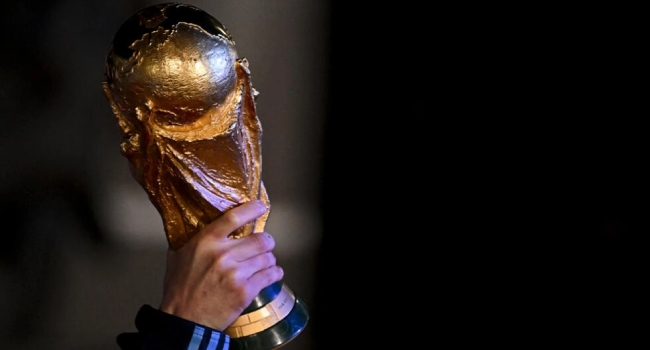FIFA has rated Saudi Arabia’s bid to host the 2034 World Cup as “medium risk” in terms of human rights, according to its comprehensive evaluation report.
The report, which was released on Saturday, stated that addressing the human rights issues tied to the bid could require “significant time and effort,” particularly as Saudi Arabia continues to pursue reforms in various sectors.

The findings in the report come ahead of the FIFA Congress scheduled for December 11, when delegates will vote on the hosts for the 2030 and 2034 World Cups.
Saudi Arabia is currently the sole candidate for the 2034 World Cup, while a joint bid from Morocco, Spain, and Portugal is competing for the 2030 tournament.
The 2030 World Cup will mark the centenary of the event, and Uruguay, Argentina, and Paraguay will also be hosting matches as part of this historic edition.
FIFA acknowledged the strength of Saudi Arabia’s bid, describing it as a “very strong all-round proposition” in terms of technical evaluation, infrastructure readiness, and commercial potential. In particular, the report highlighted the country’s proposed sports facilities and infrastructure, as well as the substantial financial backing behind the bid.
With an average score of 4.2 out of 5, Saudi Arabia’s bid surpassed the combined bid from the United States, Canada, and Mexico for the 2026 World Cup, signaling significant potential for the tournament in terms of logistics and commercial success.
However, FIFA also issued a caution about the potential human rights implications of holding the World Cup in Saudi Arabia. The report outlined that implementing necessary reforms, especially in areas such as gender equality, freedom of expression, and labor rights, would require substantial efforts and time.
Despite these concerns, FIFA stressed that the 2034 World Cup could serve as a significant catalyst for human rights reforms in Saudi Arabia and across the region.
The tournament could provide the impetus for change and, as FIFA stated, “contribute to positive human rights outcomes for people in Saudi Arabia and the region that extend beyond the scope of the tournament itself.”
While the technical aspects of the Saudi bid are considered strong, the country still faces several challenges in completing the necessary infrastructure before the tournament.
Several proposed stadiums are yet to be constructed, and plans for the World Cup may involve holding the event during the winter months, as was the case for the 2022 World Cup in neighboring Qatar, to avoid extreme summer heat.
The issue of human rights remains one of the most contentious aspects of Saudi Arabia’s bid. Rights organizations have long criticized the kingdom for its human rights record, which includes mass executions, allegations of torture, and severe restrictions on women’s rights.
Under Saudi Arabia’s conservative male guardianship system, women face significant restrictions in various aspects of their lives, including the right to travel or marry without male approval.
Freedom of expression in Saudi Arabia is severely curtailed, with individuals often facing long prison sentences for voicing dissent or criticizing the government, particularly on social media platforms. This has led to concerns over the country’s record of silencing opposition voices.
The kingdom has also faced accusations of “sportswashing,” a term used to describe the practice of using high-profile sports events to divert attention from controversial or damaging issues related to human rights.
Saudi Arabia’s hosting of events like Formula One and the WTA Finals has raised similar concerns, as critics argue that the country is using these platforms to improve its global image and distract from ongoing human rights violations.
Despite these ongoing concerns, the kingdom has been making efforts to present a more progressive image through its Vision 2030 plan, which includes reforms aimed at modernizing its economy and society.
These efforts include changes to its entertainment sector, increased participation of women in sports, and significant investments in infrastructure.
FIFA’s report acknowledged that, while the country’s rights record remains problematic, there is potential for the 2034 World Cup to bring about positive changes that could align with global standards on human rights.
























































![[FREE FREE MONEY] Predict and Win a Guaranteed GH¢200 From Us EVERY WEEK](https://wordpress.ghanatalksradio.com/wp-content/uploads/2022/02/Predict-and-Win-Final-09-03-2021-218x150.jpg)
![[Predict & Win – 8th/Oct.] WIN A Guaranteed ¢200 From Us This Week](https://wordpress.ghanatalksradio.com/wp-content/uploads/2021/10/maxresdefault-16-218x150.jpg)
![[Predict & Win – 2nd] WIN A Guaranteed ¢200 From Us This Week](https://wordpress.ghanatalksradio.com/wp-content/uploads/2021/09/maxresdefault-50-218x150.jpg)
![[Predict & Win – 25th] WIN A Guaranteed ¢200 From Us This Week](https://wordpress.ghanatalksradio.com/wp-content/uploads/2021/09/maxresdefault-36-218x150.jpg)
![[Predict & Win – 18th] WIN A Guaranteed ¢200 From Us This Week](https://wordpress.ghanatalksradio.com/wp-content/uploads/2021/09/maxresdefault-23-218x150.jpg)









![[National cathedral] See full list of churches that have contributed since 2018](https://wordpress.ghanatalksradio.com/wp-content/uploads/2020/09/Ghana-National-Cathedral-GhanaTalksRadio-100x70.jpg)



